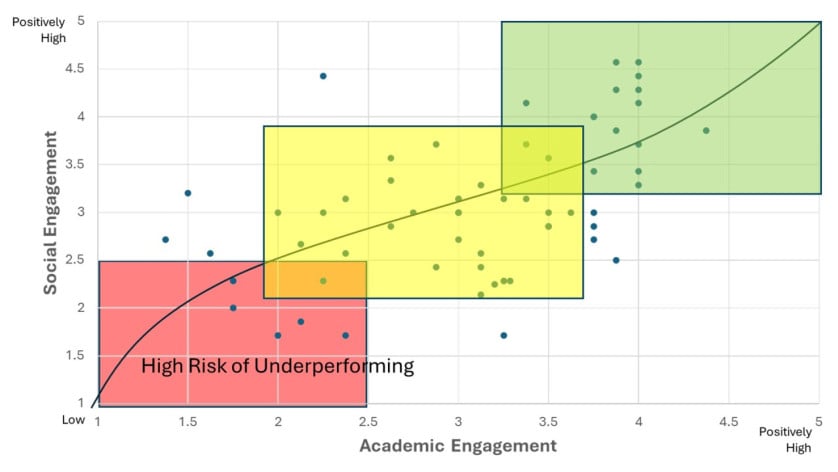
Chartered ABS responds to the DfE’s technical consultation on the International Student Levy
The Chartered ABS has submitted its response to the Department for Education’s technical consultation on the International Student Levy.
- Home
- / Insights
- / Knowledge sharing
- / Improving engagement for international students
Improving engagement for international students

Authors

Andrea Faustino
Deputy Head (Education), Southampton Solent University, Department of Business and Law

Dr Richard Gibbs
Senior Lecturer, Southampton Solent University, Department of Business and Law
Richard Gibbs and Andrea Faustino share their approach for improving international student engagement, which has resulted in an improvement of roughly 5% on both social and academic engagement at Southampton Solent University.
Despite the recent drop in numbers, international students remain, culturally and economically, important to business schools and universities in the UK. Students from India, Africa as well as the Far and Middle East make a vibrant contribution to our schools, as well as representing a significant income stream. However, their non-domestic origin conspires with their Black, Asian or other minority ethnicity (BAME) so that there is evidence of poorer performance, a heightened chance of non-completion and lower post-qualification success. Multiple factors, both academic and social, have been identified as making their engagement more challenging.
At Southampton Solent (SSU), we have found that upwards of 20% of international postgraduate students fall into a category of very high concern in terms of disengagement and dropping out from their course, as a result of these challenges.

We have focussed our attention of the factors that are commonly reported in the academic literature as having a greatest negative impact on international student engagement. These cover both social and academic challenges and include:
Missing context due to later arrival as a result of Visa and Immigration issues
Time constraints on completion of formatives and mid-semester summative, both as a result of later arrival and differences in teaching styles and practices leading to misunderstanding of what is required
General anxiety and stress caused by being in unfamiliar surroundings with high self-expectations. This for mature postgraduate students can be compounded with unsocial hours part-time work, family responsibilities, and schooling
Difficulty becoming engaged in the social life at the university due to outside commitments, language barriers, and lack of familiarity with extracurricular activities
A lack or deficiency in the level of English needed for academic writing and discussion lowers confidence, self-esteem, and motivation.
And the list goes on…
This is not to say that all students suffer the same problems, to the same degree, or that these issues are exclusive to international students, as first-generation students can readily attest.
Our approach
At SSU, we have been regularly assessing and taking feedback from our students on the nature and level of their concerns. This has enabled us to put in place certain selected interventions and to measure the before and after effect.
The first few weeks for many students can be frantic and traumatic. A buddying system with a student from an earlier intake can be a source of answers to many FAQs. It also allows new students to feel that their worries and concerns are not exceptional or unusual. We have responded to student feedback to extend this approach to cover the few weeks prior to physical arrival, especially for students who have notified us of later arrival i.e. after welcome week.

Celebratory events such as at Christmas or at Easter can bring together students in a typically English social setting while also allowing students to network with their peers, lecturers, and local organisations.
None of these interventions, whether there are catch-up sessions or personal tutoring, is radically new or innovative; what adds value, we believe, is the holistic and consistent way we have implemented them.
Results and conculsions
This constant and ongoing attention, alongside the teaching and assessments, has produced a before and after improvement of roughly 5% on both social and academic engagement from first few weeks of the semester to the end. Sadly, some factors worsened, over the year, notably, students’ experience of discrimination outside of the university.
This approach is providing a measure and a guide to improving international student performance. The anticipation is that this will translate into better grades and fewer departures.
We would be delighted to hear any feedback or examples of interventions that have been successful. If any institution wishes to run a similar survey, please contact us for details at [email protected]
